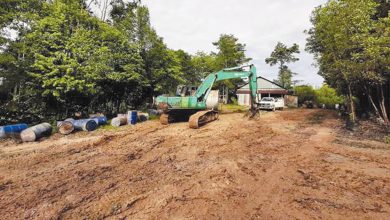Birds Foul-Up Clear Vision
By Mariam Mokhtar
Malaysians are aware that the use of CCTVs has taken off in Malaysia. The idea is to reduce our dependency on security guards, because of problems in finding suitable and responsible workers.
According to one industry expert, CCTV operations are cheaper in the long run. They can be operated 24 hours per day, seven days a week. The CCTVs are not affected by employees calling in sick, staff annual holidays, emergency leave or staff who are absent from their posts for long coffee breaks or extended lunches.
In March 2010, the Ipoh City Council made plans to install an additional 76 CCTVs, to augment the 24 units which had already been approved by the Housing and Local Government Ministry.
Ipoh Mayor Roshidi Hashim said that the installation would enhance security in the rapidly developing Ipoh city and its surroundings. Business centres were being built in areas further from the city centre, like Simpang Pulai, Bercham or Taman Meru, and Roshidi said that CCTVs would help reassure residents, within and outside the city centre, of their safety.
Roshidi said that each CCTV unit was estimated to cost RM3,000 and that funding for the additional CCTVs would be borne by the taxpayer. The CCTVs would be linked to a control room in the city council and also to the Perak police headquarters.
It is gratifying to note that the rural community is not excluded from the promotion of the use of CCTVs. There is a drive by the Malaysian government, to upgrade 15 community colleges throughout the nation, and the Gerik Community College (GCC) has already received 16 CCTVs. The total upgrade allocation for nationwide colleges cost the government RM50.17 million.
The 2012 Auditor-General’s Report revealed a huge price difference between the price of the CCTVs supplied to GCC and those supplied to a similar college in Masjid Tanah, Malacca. One CCTV unit in Gerik was valued at RM85,500 compared with the Masjid Tanah one, which cost RM10,249. The CCTVs in Masjid Tanah was approximately eight times cheaper than the cameras in Gerik.
The high cost of the CCTV installation in Gerik can be attributed to its rural location and the difficulty of finding experienced contractors, who were willing to undertake work in the countryside. Gerik is more remote than Masjid Tanah.
The Education Ministry has justified the high cost of the CCTVs, by claiming that they had been purchased separately. They said, “The specifications, design, suppliers, locations and method of installation were different. The prices had been reviewed during the tender process as part of the entire project cost.” This sounds very plausible.
Critics of the audit claimed that a CCTV, which had been installed on the second floor of a college, had lacked a zoom function, whilst another CCTV which could rotate 360 degrees had been mounted on a wall, and was unable to make full use of this function.
These critics failed to note that CCTVs are very expensive and are possibly worth more than the fixtures they are secured to, or even the buildings which they are monitoring. CCTVs need careful positioning.
The audit revealed that one camera had stopped recording because its disc was full, but the more serious issue, was the bird droppings covering the CCTVs, which rendered the cameras useless.
Blame had initially been placed on the maintenance of these units, but it is disingenuous for the critics to blame the maintenance crew, especially as it is common knowledge that the Malaysian work culture does not normally include maintenance. It is possible that the need for regular maintenance, was overlooked in the tendering process.
Sources, who wished to remain anonymous, said that it is a generally accepted government policy, that it is better to procure new equipment than to maintain old equipment.
Malaysians prefer to replace items, as soon as they become obsolete, through frequent use or a breakdown in one of the components, although the CCTV which stopped functioning just needs a new disc to resume recording.
Anyone living or working in rural locations knows that it is normal for birds to leave droppings on fixed structures like those situated near the eaves of roofs. The amount deposited is directly proportional to the quantity of birds in the area. In other words, more birds mean more droppings. More extreme suggestions to rectify the problem include building a cage to house the CCTVs, or a team of sharpshooters to kill the birds before they can perch on the CCTVs.
A report which has yet to be commissioned, will propose that a team of dedicated workers will be required, to clean the CCTVs on a regular basis. This will provide jobs for people living in the local area and thus, attract praise from the community. A strong message is being delivered, that machines need humans to make them function properly.
Cleaning bird droppings from CCTV lenses is a small price to pay in the fight against crime. Unfortunately, the birds are not the only ones fouling up the system.


